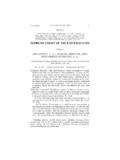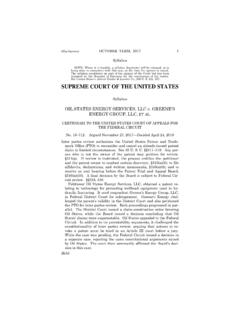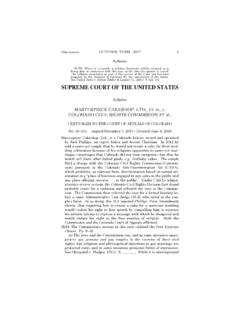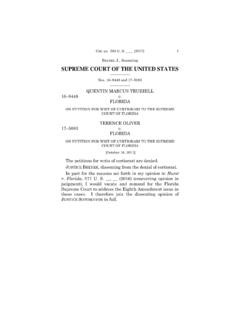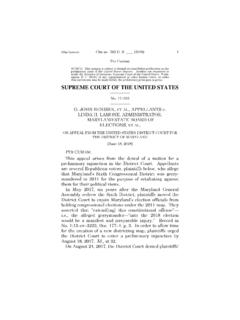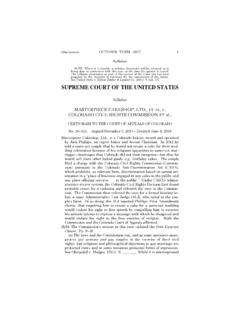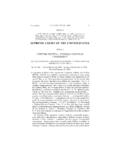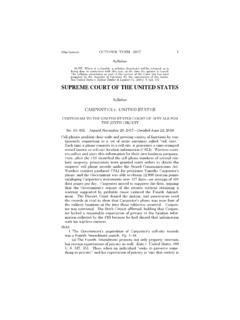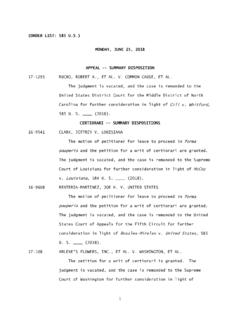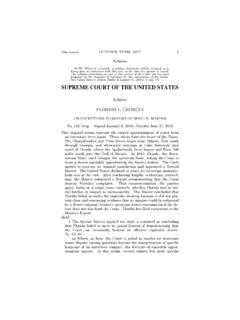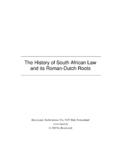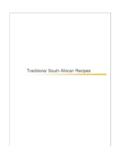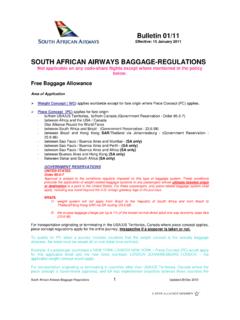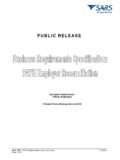Transcription of SUPREME COURT OF THE UNITED STATES
1 1 (Slip Opinion) OCTOBER TERM, 2017 Syllabus NOTE: Where it is feasible, a syllabus (headnote) will be released, as isbeing done in connection with this case, at the time the opinion is syllabus constitutes no part of the opinion of the COURT but has beenprepared by the Reporter of Decisions for the convenience of the reader. See UNITED STATES v. Detroit Timber & Lumber Co., 200 U. S. 321, 337. SUPREME COURT OF THE UNITED STATES Syllabus south DAKOTA v. WAYFAIR, INC., ET AL. CERTIORARI TO THE SUPREME COURT OF south DAKOTA No. 17 494.
2 Argued April 17, 2018 Decided June 21, 2018 south Dakota, like many STATES , taxes the retail sales of goods and ser-vices in the State. Sellers are required to collect and remit the tax tothe State, but if they do not then in-state consumers are responsiblefor paying a use tax at the same rate. Under National Bellas Hess, Inc. v. Department of Revenue of Ill., 386 U. S. 753, and Quill Corp. v. North Dakota, 504 U. S. 298, south Dakota may not require a busi-ness that has no physical presence in the State to collect its sales compliance rates are notoriously low, however, and it is estimated that Bellas Hess and Quill cause south Dakota to lose be-tween $48 and $58 million annually.
3 Concerned about the erosion of its sales tax base and corresponding loss of critical funding for stateand local services, the south Dakota Legislature enacted a law re-quiring out-of-state sellers to collect and remit sales tax as if theseller had a physical presence in the State. The Act covers only sellers that, on an annual basis, deliver more than $100,000 of goods or services into the State or engage in 200 or more separate transac-tions for the delivery of goods or services into the State. Respond-ents, top online retailers with no employees or real estate in SouthDakota, each meet the Act s minimum sales or transactions require-ment, but do not collect the State s sales tax.
4 south Dakota filed suit in state COURT , seeking a declaration that the Act s requirements arevalid and applicable to respondents and an injunction requiring re-spondents to register for licenses to collect and remit the sales sought summary judgment, arguing that the Act is un-constitutional. The trial COURT granted their motion. The State Su-preme COURT affirmed on the ground that Quill is controlling prece-dent. Held: Because the physical presence rule of Quill is unsound and incor-rect, Quill Corp. v. North Dakota, 504 U. S. 298, and National Bellas 2 south DAKOTA v.
5 WAYFAIR, INC. Syllabus Hess, Inc. v. Department of Revenue of Ill., 386 U. S. 753, are over-ruled. Pp. 5 24.(a) An understanding of this COURT s Commerce Clause principlesand their application to state taxes is instructive here. Pp. 5 9.(1) Two primary principles mark the boundaries of a State s au-thority to regulate interstate commerce: State regulations may notdiscriminate against interstate commerce; and STATES may not im-pose undue burdens on interstate commerce. These principles guide the courts in adjudicating challenges to state laws under the Com-merce Clause. Pp. 5 7.(2) They also animate Commerce Clause precedents addressingthe validity of state taxes, which will be sustained so long as they (1) apply to an activity with a substantial nexus with the taxing State,(2) are fairly apportioned, (3) do not discriminate against interstatecommerce, and (4) are fairly related to the services the State pro-vides.
6 See Complete Auto Transit, Inc. v. Brady, 430 U. S. 274, 279. Before Complete Auto, the COURT held in Bellas Hess that a seller whose only connection with customers in the State is by common car-rier or .. mail lacked the requisite minimum contacts with theState required by the Due Process Clause and the Commerce Clause,and that unless the retailer maintained a physical presence in theState, the State lacked the power to require that retailer to collect a local tax. 386 U. S., at 758. In Quill, the COURT overruled the due process holding, but not the Commerce Clause holding, grounding thephysical presence rule in Complete Auto s requirement that a taxhave a substantial nexus with the activity being taxed.
7 Pp. 7 9.(b) The physical presence rule has long been criticized as giving out-of-state sellers an advantage. Each year, it becomes further re-moved from economic reality and results in significant revenue lossesto the STATES . These critiques underscore that the rule, both as first formulated and as applied today, is an incorrect interpretation of the Commerce Clause. Pp. 9 17.(1) Quill is flawed on its own terms. First, the physical presencerule is not a necessary interpretation of Complete Auto s nexus re-quirement. That requirement is closely related, Bellas Hess, 386 U. S. at 756, to the due process requirement that there be some defi-nite link, some minimum connection, between a state and the person, property or transaction it seeks to tax.
8 Miller Brothers Co. v. Mary-land, 347 U. S. 340, 344 345. And, as Quill itself recognized, a busi-ness need not have a physical presence in a State to satisfy the de-mands of due process. When considering whether a State may levy a tax, Due Process and Commerce Clause standards, though not identi-cal or coterminous, have significant parallels. The reasons given in Quill for rejecting the physical presence rule for due process purposes 3 Cite as: 585 U. S. ____ (2018) Syllabus apply as well to the question whether physical presence is a requisitefor an out-of-state seller s liability to remit sales taxes.
9 Other aspects of the COURT s doctrine can better and more accurately address poten-tial burdens on interstate commerce, whether or not Quill s physical presence rule is satisfied. Second, Quill creates rather than resolves market distortions. In effect, it is a judicially created tax shelter for businesses that limit their physical presence in a State but sell their goods and services to the State s consumers, something that has become easier and moreprevalent as technology has advanced. The rule also produces an in-centive to avoid physical presence in multiple STATES , affecting devel-opment that might be efficient or desirable.
10 Third, Quill imposes the sort of arbitrary, formalistic distinction that the COURT s modern Commerce Clause precedents disavow in fa-vor of a sensitive, case-by-case analysis of purposes and effects, West Lynn Creamery, Inc. v. Healy, 512 U. S. 186, 201. It treats eco-nomically identical actors differently for arbitrary reasons. For ex-ample, a business that maintains a few items of inventory in a smallwarehouse in a State is required to collect and remit a tax on all of itssales in the State, while a seller with a pervasive Internet presence cannot be subject to the same tax for the sales of the same 10 14.
